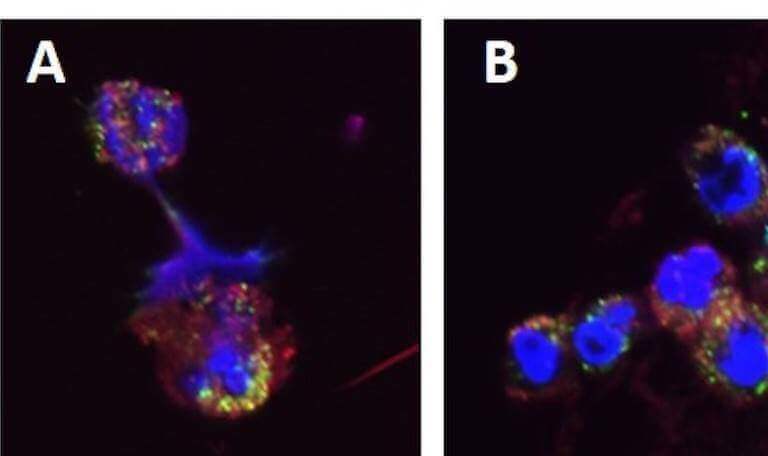OVPR Announces 2021 PIRS Seed Grant Recipients
By Caitlin Ware, Iowa State University Office of the Vice President for Research
Posted Mar 22, 2021

By Caitlin Ware, Iowa State University Office of the Vice President for Research
Posted Mar 22, 2021

The Iowa State University Office of the Vice President for Research (OVPR) has awarded $100,000 in 2021 Presidential Interdisciplinary Research Seed Grant Program (PIRS) funding to support two projects focused on addressing novel treatments for human health conditions.
Established in 2017, the PIRS program is administered annually by the OVPR, and supported with funds from the Office of the President and an endowment from the Mary G. Miller estate. Associate professor of small animal internal medicine Dana LeVine and associate professor of pathology Austin Viall were recently selected to receive $50,000 in PIRS funding, and will lead a research team to investigate causes of blood clotting and lung inflammation in COVID-19 using a unique hamster model. Professor of genetics, development, and cell biology Eric Henderson and associate professor of genetics, development, and cell biology Geetu Tuteja were also selected to receive $50,000 in PIRS funding, and will explore creation of a nanotechnology platform for targeted gene editing.
“We’re delighted to provide PIRS funding to support the leading-edge research of doctors LeVine, Viall, Henderson, and Tuteja,” said Vice President for Research Peter Dorhout. “Their work truly reflects the purpose of PIRS funding – to support high-risk, high-reward projects that could turn into larger initiatives with the potential to deliver positive life-changing impacts to millions in our society.”
As of March 1, 2021, there have been more than 113 million confirmed cases of COVID-19, including 2,527,891 deaths. Complicating effective treatment methods is a major gap in understanding why the respiratory disease affects each patient differently. While some people remain asymptomatic, others develop severe, and often deadly, complications including lung inflammation, acute respiratory distress syndrome, and excessive blood clotting.

LeVine and Viall’s project, “Unravelling the Role of Neutrophil Extracellular Traps in the Pathogenesis of Severe COVID-19,” will explore evidence that suggests virus-induced neutrophil extracellular traps (NETs) play a crucial role in COVID-19 infections. NETs are protective webs of DNA and enzymes secreted by inflammatory cells to combat bacteria and disease — a necessary part of the human immune system. But left unchecked, NET production can induce unwanted inflammation and clotting.
Until now, the absence of a relevant animal model has prevented evaluation of the role NETs play in severe COVID-19 illness. LeVine and Viall’s research team will use Syrian hamsters to develop a brand-new animal model that properly mirrors the effect of the virus in humans and assesses the ability of hamsters to generate NETs in response to COVID-19. With relevant data in hand, the pair hopes to investigate the ability of NET-regulating drugs to improve hamster, and ultimately human patient, outcomes.

“With COVID-19, everything is high-risk because we are still learning about the disease,” Viall said. “This horrible pandemic has impacted millions of lives. We’re hopeful that by pursuing this project we can find something that will be useful for people everywhere.”
If successful, the new model will provide the first confirmation that NETs cause severe COVID-19 complications and offer a platform to test the efficacy of “NETosis” inhibitors in improving patient survival.
“When the COVID-19 pandemic began, many of us in the scientific community, including myself, felt completely helpless,” LeVine said. “I wanted to do something to utilize my expertise to help improve outcomes of patients who contract the disease. We’re very grateful for this opportunity to pursue COVID-19 research through the PIRS program.”
At the core of many human health conditions, from diabetes and cancers to errors in placental development, are underlying genetic malfunctions. Through their project, “Novel DNA Nanotechnology for Targeted Gene Editing In Vivo,” Henderson and Tuteja will use PIRS funding to capitalize on this understanding by creating a new nanotechnological platform that can directly edit disease-relevant genes in living systems.

By leveraging advancements in nanotechnology, Clustered Regularly Interspaced Short Palindromic Repeats (CRISPR) technology, and Cas9 (a CRISPR-associated enzyme that acts as “molecular scissors” to cut DNA at a specific location), their research will seek to build self-assembling, gene-editing DNA nanoparticles. Capable of cell-specific genetic modification, the proposed nanoparticles would operate as tiny biological machines that can be programmed to fix unique genetic errors in living human patients.
“This is the next generation of personalized health,” Henderson said. “It’s the possibility of providing specific, tailored solutions to often devastating genetic health conditions. It’s a new era of not just therapeutics, but potentially, actual cures for disease.”
The nanotechnology will be evaluated using human placental “trophoblasts” (the cells that provide nutrients to embryos), which are regarded as a well-established developmental and cancer model. If successful, the tools and information generated by Henderson and Tuteja’s research will create a new technological platform for treating and possibly curing multiple gene-based syndromes and diseases.

“Institutional funding opportunities such as the PIRS program are critical in supporting researchers as they gather the preliminary data necessary to obtain bigger, more impactful funding in the future,” Tuteja said. “We are thrilled to have the support necessary to begin this innovative work in biomedical applications.”
The Presidential Interdisciplinary Research Seed Grant Program (PIRS) is open to full-time, tenured/tenure-eligible, and term faculty with the rank of assistant professor, assistant teaching professor, clinical assistant professor, and adjunct assistant professor, or higher ranking faculty from any discipline. PIRS supports the initial development of innovative research, with up to $50,000 in funding designated for selected teams to pursue high-risk, high-reward projects over a two-year period. The awards are designed to support projects that help researchers from different disciplines collaborate on groundbreaking research, including collecting data, organizing workshops, and building partnerships with other organizations.